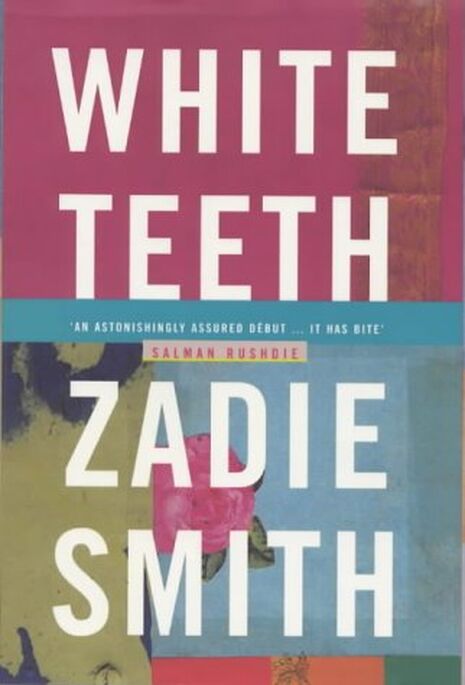Zadie Smith at Pembroke
Varsity Books Editor, Emily Page, gives the low down on the Cambridge alumnus’s visit to Pembroke

“Why are you all so quiet? Is that lectures?”
Zadie Smith casts a rare glance out into the audience, her sardonic edge cutting through the heady cocktail of post-exam languor and the body odour of early summer which fills the Judith E Wilson drama studio. A packed audience laughs nervously, the room having reached full capacity a full forty minutes before in anticipation of Smith, prize-winning author of ‘White Teeth’ and King’s College alumnus.
In the best kind of talks and interviews put on in Cambridge, themes seem to inevitably emerge, and thankfully Smith’s visit to the Faculty of English on the 2nd June falls into this category, an interview that draws on her time as a student at Cambridge in the 1990s, her experience of North London as a child and of New York as an adult.In the moments before Smith enters the room one especially nervous student in the second row, after detailing the travails of removing a particularly potent mix of cava and glitter from one’s hair, earnestly diagnoses himself with ‘White Man’s Complex’: the compulsion to ‘shut up and listen’. His anxiety might reflect the composition of the audience, which although in typical Cambridge fashion lacks substantial representation of BME students, is predominantly female. There is also the expectation that the arrival of Smith, whose books often concern the complications gender and ethnicity bring to bear on our personal relationships, will precipitate debate on these so often highly contested issues.
But beginning the interview with a reading of her new short story, ‘Escape from New York’, serves to remind the audience that Smith is first and foremost not an emblem or a symbol for any particular cause or opinion, but a writer. The story, inspired by the urban myth of the ‘escape’ allegedly undertaken by Michael Jackson, Marlon Brando and Elizabeth Taylor after planes hit the twin towers on 11th September 2001, also serves as an opportunity for Smith to showcase her unexpectedly hilarious Michael Jackson impression. Cynics might suggest that Smith’s subject matter demonstrates her attachment to the early Noughties, the era of her most groundbreaking success with the wild acclaim ‘White Teeth’ was met with upon its publication in 2000. But throughout the interview one senses very much Smith’s ambivalence towards the success of the book, which after determined questioning from members of the audience she claims not to have read since she sent it off to the publishers.
Indeed, Smith seems to consider her move to New York an escape, not only from the attention she received at the hands of the British press, but from the mentality she was surrounded by and internalised during her time at Cambridge. She talks of the constant need to please, to seek approval from peers and supervisors, exacerbated by the inferiority she felt as a student coming from a less-than-privileged background. Her ambivalence is summed up when asked if she is pleased to be back in Cambridge, she casts another of those rare penetrating, knowing looks out to the audience, murmuring dryly that ‘the weather’s nice’.
Smith’s comments on the need she felt to write, talk and argue like a man in her time at Cambridge recall the recent controversy at Cambridge concerning the lack of firsts achieved by female students in essay-writing subjects at Cambridge, particularly in the Faculty of History. As scripts are marked blind, it was suggested that female students needed to write with greater aggression, conviction and flowery language. It seems that in this respect at least little has changed since Smith’s time at the university. And she has damning criticism too for Cambridge’s current accessibility, pointing out that were she 18 today she simply would not have applied, on financial grounds. She does, however, speak positively about the advantages a Cambridge education brought her, suggesting that in order to break the rules, you need to learn them first.
In terms of Smith’s writing, it seems too that she is now breaking the rules she once set for herself. She is no longer so interested in the voice of the disinterested author, and not so scared any more of being seen as an ‘angry writer’. In a way, maybe it is helpful that the conversation surrounding Smith is always so haunted by the spectre of ‘White Teeth’, as it marks the way in which her writing has changed, less concerned with aphorisms and sweeping pronouncements on human nature, more interested in reflecting the extraordinarily complex emotional lives of normal human beings. ‘As you get older,’ she explains, ‘you become so less confident in summing up the entirety of a person in a couple of sentences.’ As students flock out at the end of the talk, rising up from the basement of the Faculty to an early June evening, the embrace of uncertainty, in life and in writing, seems to have been the embrace of uncertainty. It doesn’t escape one earnest Varsity reviewer that this is the exact kind of aphorism Zadie Smith would probably hate.Emily Page
 News / Colleges charge different rents for the same Castle Street accommodation2 March 2026
News / Colleges charge different rents for the same Castle Street accommodation2 March 2026 News / News in Brief: waterworks, wine woes, and workplace wins 1 March 2026
News / News in Brief: waterworks, wine woes, and workplace wins 1 March 2026 News / Angela Merkel among Cambridge honorary degree nominees27 February 2026
News / Angela Merkel among Cambridge honorary degree nominees27 February 2026 News / Climate activists protest for ‘ethical careers policy’1 March 2026
News / Climate activists protest for ‘ethical careers policy’1 March 2026 News / King’s hosts open iftar for Ramadan3 March 2026
News / King’s hosts open iftar for Ramadan3 March 2026








